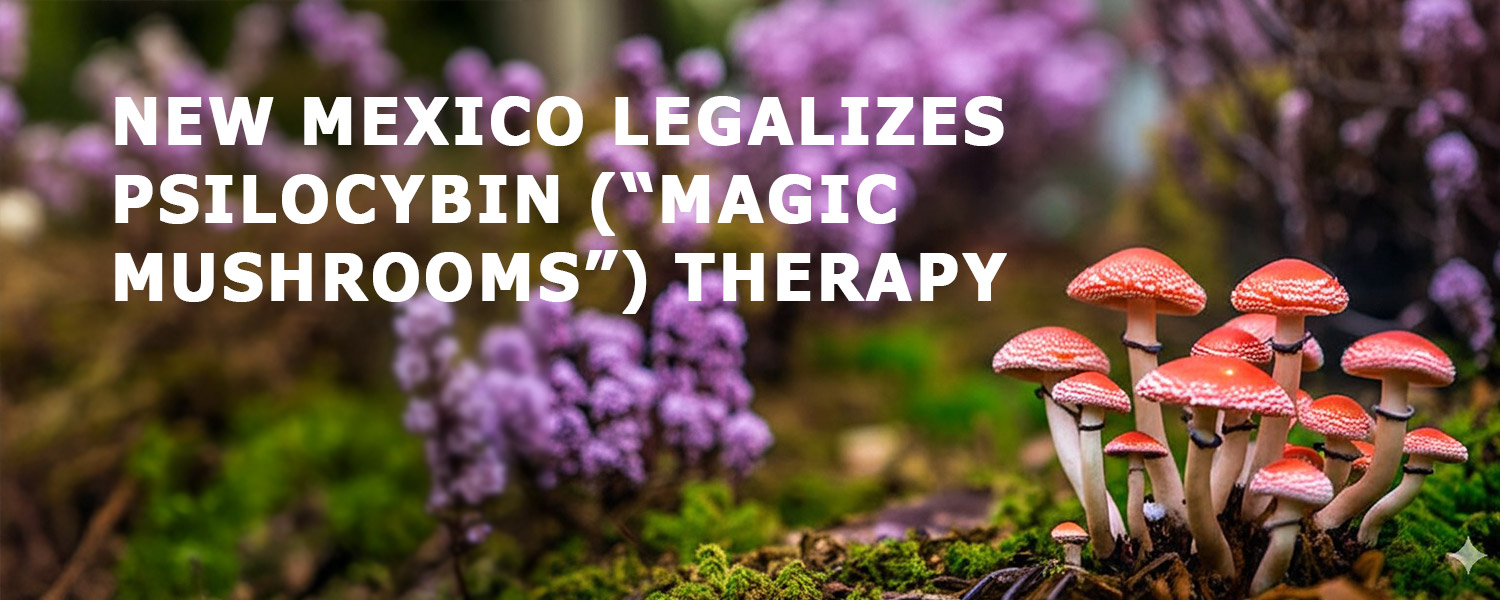New Mexico Legalizes Psilocybin (“Magic Mushrooms”) Therapy
On April 7, 2025, New Mexico Governor Michelle Lujan Grisham signed into law SB-219, the Medical Psilocybin Act (the “Act”), making New Mexico the third state in the country to create a legal pathway for patients to access psilocybin, a naturally occurring psychedelic compound produced by certain types of mushrooms. Notably, New Mexico is the first state to do so through legislation. Oregon and Colorado, the first two states to legalize access to psilocybin, were approved through voter initiatives. The Medical Psilocybin Act will allow patients with certain qualifying conditions to access the psychedelic and use it under the guidance of a licensed healthcare provider. The measure says the purpose “is to allow the beneficial use of psilocybin in a regulated system for alleviating qualified medical conditions,” including major treatment-resistant depression, PTSD, substance use disorders and end-of-life care. The state Department of Health would be able to approve additional conditions.
Under the newly signed legislation, psilocybin therapy will consist of a preparation session, an administration session and a follow-up integration session. The New Mexico Department of Health (the “Department”) will be responsible for establishing guidelines around training for clinicians and producers, including dosage, approved settings for administration, production and storage protocols and other best practices. State officials will also license producers to grow mushrooms and process psilocybin.
Under the Act, a “qualifying patient” could include minors, so long as a licensed health care provider has judged the patient to be a medically appropriate candidate for the use of medical psylocibin based on being diagnosed with a qualifying condition. A “qualifying condition” is limited to: (1) major treatment-resistant depression; (2) PTSD; (3) substance use disorders; and (4) end-of-life care. However, other conditions may be approved by the Department for inclusion in the Program.
Synthetic psilocybin and synthetic analogs of the substance will not be allowed under the proposal. A nine-member advisory board will recommend additional qualifying conditions as well as rules around preparation and dosage. The board will also review outside petitions for additional qualifying conditions. Furthermore, a medical psilocybin treatment equity fund will help offset costs of treatment for qualified patients who meet income requirements that would be set by the health department and a medical psilocybin research fund will issue grants to support research into “any facet of the medical use of psilocybin.”
A Complex Tax Landscape for Psychedelics and Cannabis
Similarly to Cannabis, where the Federal government has outlawed it but various states have legalized Cannabis, a complex tax landscape may be created for legal businesses involved in psychedelic activities. Many psychedelics fall under the category of Schedule I substances under the Controlled Substances Act. This classification usually results in the disallowance of federal tax deductions related to the production and sale of these substances. IRS Code Section 280E, originally conceived for illegal drug trafficking organizations, has been used to restrict deductions for businesses engaged in the sale of controlled substances. But companies involved in legal psychedelic activities, specifically such as research or therapy, may not be subject to the same restrictions, potentially allowing them to claim deductions, such a Cannabis businesses do. For example, Cannabis business owners can deduct their cost of goods sold, which is basically the cost of their inventory. What isn’t deductible are the normal overhead expenses, such as advertising expenses, wages and salaries, and travel expenses. In addition, businesses operating in the psychedelics industry and Cannabis industry must navigate different state tax laws.
What Should You Do?
The nuance of this subject matter and different federal and state tax laws can be a challenge for some business owners. You know that at the Law Offices Of Jeffrey B. Kahn, P.C. we are always thinking of ways that our clients can save on taxes. Tax problems are usually a serious matter and must be handled appropriately so it is important to that you’ve hired the best lawyer for your particular situation. The tax attorneys at the Law Offices Of Jeffrey B. Kahn, P.C. located in Orange County (Irvine), San Diego County (Carlsbad) and elsewhere in California are highly skilled in handling tax matters and can effectively represent at all levels with the IRS and State Tax Agencies including criminal tax investigations and attempted prosecutions, undisclosed foreign bank accounts and other foreign assets, and unreported foreign income. Also if you are involved in cannabis, check out what a cannabis tax attorney can do for you. And if you are involved in crypto currency, check out what a bitcoin tax attorney can do for you.




